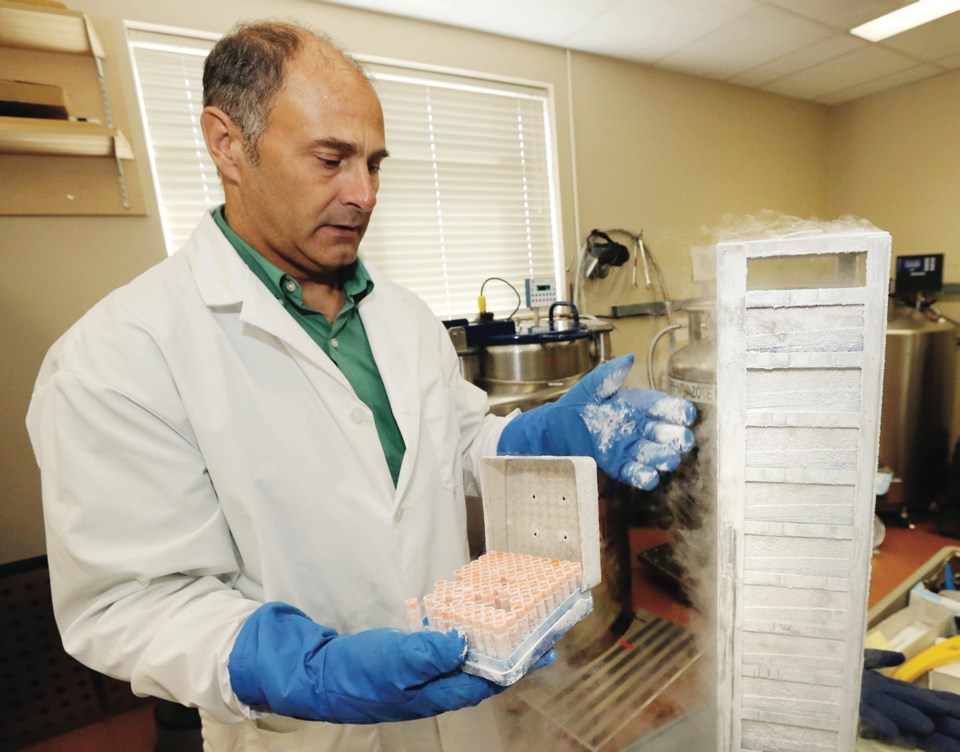Harley Davidson motorcycles, 40 scientists and the sa���ʴ�ý Cancer Agency have combined in Victoria for some of the world’s most advanced medical research.
The scientists are medical researchers at the Trev and Joyce Deeley Research Centre at the sa���ʴ�ý Cancer Agency next to the Royal Jubilee Hospital. They are engaged in a hunt to unlock elements of a body’s own immune system that could improve odds against ovarian or cervical cancer.
The Deeley Research Centre is named for Trev and Joyce Deeley, who kicked off the fundraising drive for the research wing in 2000 with a $1-million donation.
Trev Deeley was an internationally known motorcyclist and founder of a Canadian Harley Davidson dealership that still bears his name in Vancouver. Trev died in 2003 at the age of 82, predeceased by Joyce in 2001 at the age of 70 of ovarian cancer. After their deaths, it was revealed the couple had left more than $5 million to the centre to continue its work.
The Deeley Research Centre now occupies an entire floor of the sa���ʴ�ý Cancer Agency in Victoria, all of it devoted to research into ovarian and cervical cancers as the principal subjects.
Dr. John Webb, immunologist and research project leader at the Deeley centre, said immunology — the branch of medicine dealing with the body’s own natural resistance to infection and disease — appears to hold great promise for treating certain cancers.
“There is a lot of excitement around the world about immunotherapy,” Webb said last week during a tour of the Deeley centre.
He said a factor that makes cancer so difficult a disease to tackle is that the body’s own cells become cancerous. These cancerous cells form tumours. They also break off, seed other tumours and disrupt cells throughout the body. Meanwhile, the body’s own immune system sits back and fails to distinguish between cancerous and healthy cells.
“Our immune system is designed to distinguish between self, our own cells, and not self,” said Webb. “Cancer is largely ‘self,’ at least from an immunological perspective.
“But at the same time, we know the immune system and cancer are interacting,” he said.
Also, he said, ovarian and cervical cancers make good subjects for study at the Deeley centre.
Cervical cancer is relevant because it is the one cancer known to be connected to a particular virus, the human papillomavirus. The ability of the bodily immune system to combat viruses with antibodies is believed to hold a key to therapy.
Meanwhile, ovarian cancer patients, in particular, are in desperate need of a therapy beyond the generally accepted rounds of surgery, chemotherapy and radiation.
Webb said ovarian cancer is a very “stealthy” disease. Often patients fail to notice any symptoms. Once alerted by symptoms such as painful bloating or bleeding, patients too often find the cancer has reached an advanced or critical stage.
And throughout its progression, cancer cells on ovaries are easily shed into surrounding body fluid. From there they alight on other organs and form new tumours, even after treatment, bringing on new cancers. Each time cancer is beaten back and returns, it arrives with a new resistance to treatment.
So Webb’s research is checking into how a body’s own immune system, in particular the “killer T-cells” that attack invading bacteria and pathogens, can be boosted to attack a patient’s own cancer.
In part, the research is driven by findings comparing patients’ success and setbacks following treatment. The patients whose tumours, upon surgical removal and subsequent examination by a pathologist, reveal a large quantity of T-cells, are less likely to suffer a relapse.
But it’s also driven by the recognition that chemotherapy and radiation treatment will knock down patients’ own count of T-cells. This leads the patient less able to battle disease.
Also, research has revealed a body’s immune system will “switch off” after a period, perhaps a few weeks, of its own accord. This means a healthy bodily system isn’t overwhelmed by its own immune response to something like a bout of flu. But it can be less than helpful to a cancer patient.
What Webb and his team hope to accomplish by medical trials is to see if boosting a patient’s own killer T-cells will help them.
This will be done by extracting and concentrating a small sample of a patient’s T-cells after the first treatment. These cells are collected and frozen in liquid nitrogen, already being done at the Deeley centre.
When the time comes, these cells can be thawed and revitalized. Once revived, they can also be induced to reproduce and grow their numbers in an artificial medium outside the body.
Once a good supply of a patient’s own killer T-cells has been achieved, it can easily be transferred back into a patient through a simple intravenous drip.
It’s called “adoptive cell therapy,” and the people at the Deeley centre hope to try it in 2017 with about 10 to 20 patients whose cancer has returned and who are hoping for options.
At the Deeley centre, living human tumours have been induced to grow on a mouse. These tumours have then been induced to fall back and even regress completely when the mouse is injected with the T-cells.
Webb said some remarkable results have already been achieved elsewhere. Recently, in the U.S., one trial of nine patients saw two patients undergo complete regression of their cancers. A third had partial regression.
Three out of nine might not sound remarkable. Except it must be considered the patients had already undergone standard chemotherapy and radiation treatment and seen their cancers return, so hope was becoming thin.
“Patients are often clamouring to get in on these trials,” Webb said. “They have already undergone treatment and seen the cancer return so they know the traditional options are limited,” he said.
“Ovarian cancer relapse is very common,” he said. “So these patients are desperately in need of a new modality of treatment or cure.”



